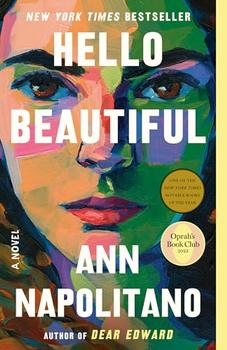Summary | Excerpt | Reading Guide | Reviews | Beyond the Book | Read-Alikes | Genres & Themes | Author Bio

A Novel
by Ann NapolitanoThis article relates to Hello Beautiful
 Ann Napolitano's novel Hello Beautiful is the story of four sisters contending with life and loss, love, death and forgiveness, and finding different ways to cope with hardship. The characters go through mental and physical rehabilitation and therapy, and make a string of rash decisions as they try to find a way to deal with the ups and downs of life. The poetry of Walt Whitman, and his views on the cyclical nature of life and death, provide a much needed coping mechanism for several of them.
Ann Napolitano's novel Hello Beautiful is the story of four sisters contending with life and loss, love, death and forgiveness, and finding different ways to cope with hardship. The characters go through mental and physical rehabilitation and therapy, and make a string of rash decisions as they try to find a way to deal with the ups and downs of life. The poetry of Walt Whitman, and his views on the cyclical nature of life and death, provide a much needed coping mechanism for several of them.
Walt Whitman's poetry is widely regarded as therapeutic. In an essay titled "Walt Whitman's Search for a Healthy Mental Therapeutic," scholar Peter James Black asserts that in his poetry, "Whitman is suggesting that he can operate in a relationship to his reader which is equivalent to that supplied today by a surrogate life-support system." Whitman himself saw poetry as a vessel to enact a real difference in peoples' lives, much in the same way that a support system - such as a family - might. His own experiences with death further cemented his dedication to using poetry as an emotional stronghold for people going through difficult situations. Whitman's father passed away in 1855, shortly after the publication of Leaves of Grass. In 1856, he published a second edition with only a few marked differences.
In an interview with NPR, Dr. Ed Folsom, a professor of English at the University of Iowa states, "Instead of putting it in the large page format of the first edition, he put it in a very small pocket-size format because he dreamed that the working men and working women of America would be carrying it in their pockets and reading it on their lunch breaks on their jobs." After the passing of his father, it appears Whitman was inspired even further to ensure that his poetry would be available to working people with difficult lives. Writer and poet C.K. Williams says that Whitman hoped readers facing the reality of death would read his work and "be comforted and solaced even more than by the outmoded precepts of traditional religions." He further states that challenging and defying mortality "were clearly a key element of [Whitman's] intentions."
In Hello Beautiful, Sylvie is predominantly the one to use Whitman's poetry as "a surrogate life-support system," relying on it both as a reprieve from grief and as a reminder of Charlie, her Whitman-loving father. She leans on two primary quotations from Whitman's 1855 poem "Song of Myself" to give her strength through the difficulties of some of the most important relationships in her life: "I…am not contain'd between my hat and my boots" from Verse Seven of "Song of Myself," and Verse Six's description of grass as "the beautiful uncut hair of graves." These two quotations are a wonderful introduction to Whitman's ideology about death. In the line from Verse Seven, Whitman asserts that a person is more than their physical self. In the passage from Verse Six, we see Whitman's belief that life and death are linked in a continuous cycle wherein one feeds the other - life contained in the grass is sustained by dead matter, which fertilizes the soil. That the grass is the "uncut hair" of the grave implies that life and death are different elements on the same body.
In a newspaper review that Whitman himself wrote about "Leaves of Grass," he states that as a poet, he "recognizes no annihilation, or death, or loss of identity." This final assertion, straight from the mouth of the horse, shows us better than any critical analysis could that Walt Whitman transcends the mortal - an attitude that has supplied comfort to those in grief and pain for generations, and will continue to sit on shelves, waiting to help generations to come.
Walt Whitman, courtesy of the Library of Congress
Filed under Books and Authors
![]() This article relates to Hello Beautiful.
It first ran in the May 17, 2023
issue of BookBrowse Recommends.
This article relates to Hello Beautiful.
It first ran in the May 17, 2023
issue of BookBrowse Recommends.
Your guide toexceptional books
BookBrowse seeks out and recommends the best in contemporary fiction and nonfiction—books that not only engage and entertain but also deepen our understanding of ourselves and the world around us.